Russian partisans of 1812: "people's war"
partisans
When it comes to the Russian partisans of 1812, the first thing they think about is the "club of the people's war" (an expression that became "winged" after the publication of Leo Tolstoy's novel "War and Peace"). And they represent bearded men in the winter forest like those depicted in the painting by V. Vereshchagin.
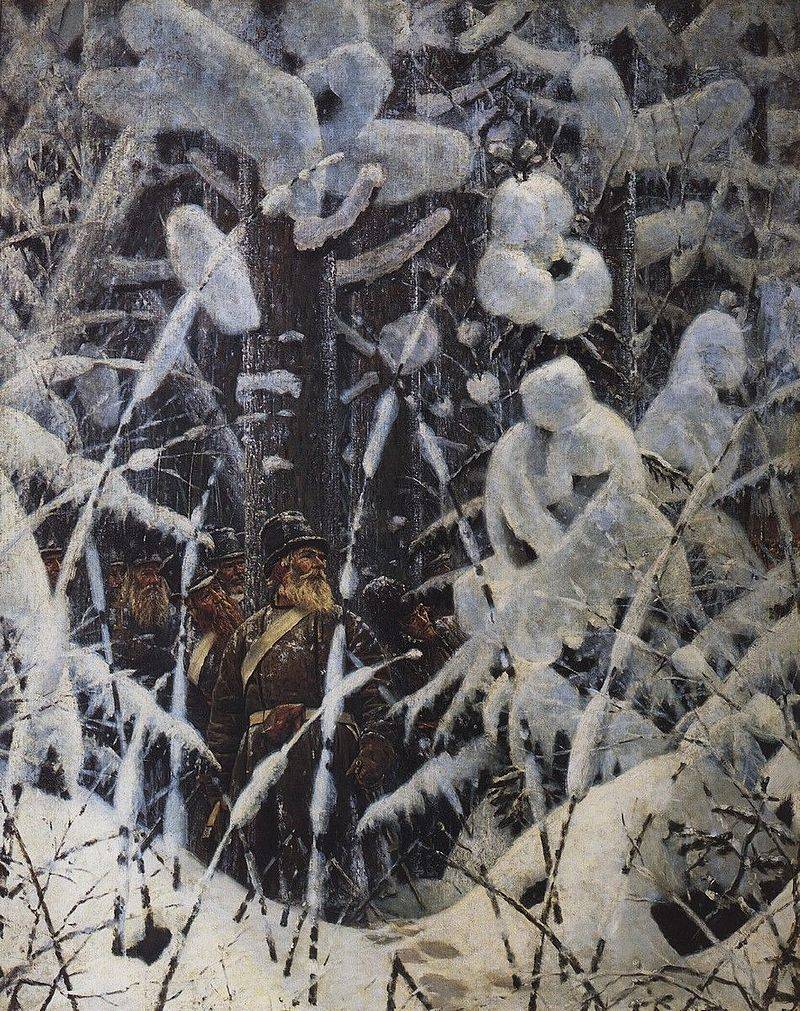
V. Vereshchagin. “Don't hide it! Let me come "
Or - "summer version", presented on this splint:
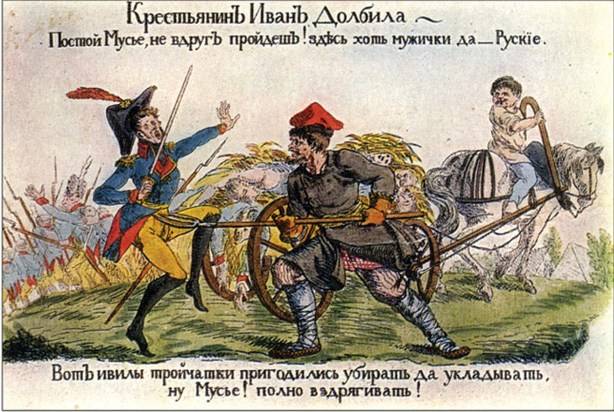
Peasant Ivan Dolbila
Or - on this British copy of a Russian lubok, 1813:
Then they recall Denis Davydov's "squadron of flying hussars". But usually this "squadron" is considered some kind of free irregular formation. Like, Davydov left with a number of hussars and Cossacks from Kutuzov and began to fight the French at his own peril and risk. Just like Serbian Yunaks or Dalmatian Uskoks with Turks.
Meanwhile, even in the "Military Encyclopedic Lexicon" published in 1856, partisans are called the formations of the regular army performing specific tasks. Most often, various cavalry units were used as such:
These detachments, often called "flying", were supposed to conduct reconnaissance and observation of the enemy's movements, constantly maintaining contact with their headquarters.
They made quick raids on the rear of the enemy, trying to disrupt communications, intercepting messengers and couriers. Small enemy detachments or foraging teams were attacking separately. Nowadays, such actions of regular troops are often called "power reconnaissance".
Peasants on foot and motley armed peasants could fight off marauders. They managed to destroy or capture small groups of lagging enemy soldiers. But for the solution of the other tasks listed above, the peasant detachments, of course, were not suitable. And they had no desire to leave their villages.
And in historical Documents from the Patriotic War of 1812 also clearly distinguish between partisan detachments ("parties") proper, composed of regular army servicemen, and detachments of peasants.
Peasant War
A number of historians of the XIX century, talking about the events of those years, when it comes to the actions of the peasants of the villages, who found themselves in the way of Napoleon's army, use the expression "People's War." Among them are D. Buturlin, A. Mikhailovsky-Danilevsky, M. Bogdanovich, A. Slezskinsky, D. Akhsharumov.
But the term "people's war" appeared in later times. And in 1812, the unauthorized arming of the peasants by the Russian government, to put it mildly, was not welcomed, since it was not clear against whom they would turn this weapon. The events of the civil war of Yemelyan Pugachev were still fresh in the memory. And most of all in Petersburg they feared that Napoleon, having announced the abolition of serfdom, would call on the peasants to divide the land of the landowners among themselves. No one had any illusions about what would follow. In this case, Alexander I would immediately conclude peace on any terms, not only with Napoleon, but also with the real Antichrist.
After the battle of Borodino, the officer of the partisan detachment in Vintsinogorod AH Benkendorf had to investigate the complaint of the landowners of the Volokolamsk district against their peasants, who allegedly robbed their estates. It turned out that the landlords were frightened by the initiative of the peasants to protect their villages and villages. And the insubordination consisted in the refusal of these peasants to disarm. The armed peasants who did not trust their serf landowners seemed more dangerous than the enemy soldiers: after all, they were "civilized Europeans" - the French, Italians, Spaniards, Germans and others.
Following the results of the check, the future chief of gendarmes reported to St. Petersburg that
I must say that the reasons for the concern of the landowners were more than weighty.
In Moscow, Napoleon received several requests for the abolition of serfdom. For example, a petition from 17 inhabitants of the city of Ruza.
In the provinces adjacent to Moscow in 1812, the number of peasant uprisings against the authorities, in comparison with previous years, increased 3 times. In the Dorogobuzh district of the Smolensk province, the peasants of a certain Baryshnikov "went out of control": they robbed the estate, stole the cattle belonging to the master, squeezed the master's bread.
Moreover, Russian officials and officers reported that the peasants of some villages near Moscow told them that they were now subjects of Napoleon:
In Volokolamsk uyezd, refusals of peasants from submission to landowners and elders were recorded on the grounds that
There have been cases of peasants issuing their owners to the French. One of them - the Smolensk landowner P. Engelhardt, even got into the list of heroes of the Patriotic War.
According to the official version, he created a detachment from his peasants, which attacked the French passing by, for which he was shot by them.
In the church of the First Cadet Corps, where he once studied, a personal memorial marble plaque dedicated to him was placed.
However, according to the unofficial version, Engelhardt was a typical "wild landowner" who cruelly oppressed his serfs. And driven to despair by his tyranny, the peasants in October 1812 decided to deal with him by someone else's hands. Finding the corpse of a French officer on the road, they buried it in the master's garden. And then they reported about the landowner leading "guerrilla" to the commander of the first detachment of the Napoleonic army that came across. Engelhardt, who understands nothing, of course, did not confess anything during interrogation. And he went down in history as a staunch Russian patriot - just the noble Ivan Susanin.
In general, the Russian nobles had very serious reasons not to trust their serfs. Therefore, Alexander I and his government would have preferred that the peasants did not get involved in their war with Napoleon. And many are now surprised by the assessment of the contribution of the peasants to the victory, sounded in the Manifesto of Emperor Alexander I of August 30, 1814, and the "gratitude" he expressed to them:
"People's War"
So, the anti-French actions of the Russian peasants were of an independent and spontaneous character. They were not supported or encouraged by the Russian authorities. But the "people's war" is not a myth. And, despite its short duration, it was quite massive and successful.
Most often, peasant detachments performed the role of local self-defense forces: the inhabitants of Russian villages were by no means eager to share with foreigners their already meager supplies. But sometimes the peasants gathered bands of "hunters" not to defend themselves against the French, but to attack small groups of stragglers from foreign soldiers.
The fact is that practically all of them carried in their knapsacks rich trophies “collected” in the captured Moscow and its environs. And the temptation to "rob the robbers" with impunity was very great. Sometimes they killed and robbed Russian officers who were dressed in uniforms similar to foreign ones, and even spoke to each other in an incomprehensible language.
Those who tried to explain something in broken Russian were mistaken for Poles, of whom there were many in Napoleon's Great Army. The fact is that the native language of many Russian nobles was French. Leo Tolstoy wrote in the novel War and Peace:
Later, in 1825, it turned out that many Decembrists, for example, M.S.Lunin, did not know the Russian language. MP Bestuzhev-Ryumin in the Peter and Paul Fortress, answering questionnaires of investigators, was forced to use a dictionary. Even little Alexander Pushkin first began to speak French (and even the first poems were written by him even before entering the Lyceum in French), and only then did he learn his native language.
In the fall of 1812, it came to the point that during cavalry raids and patrols, Russian officers were officially forbidden to speak French: upon hearing a foreign speech, the peasants who were sitting in ambush first fired shots and only then asked questions. But this did not correct the situation. In Russian, the Russian nobles spoke in such a way that the peasants, as we remember, took them for Poles. And, if they took such a "Pole" prisoner, then, as a rule, they killed - just in case. Because, suddenly, the prisoner is telling the truth - he is a Russian barchuk, and will there be punishment for the offense inflicted on him?
However, some authors believe that some of the peasants only pretended not to understand that they were dealing with Russian officers. There were no reasons for the great love of Russian serfs for the nobles at that time. And money and all sorts of useful things in the economy, as you know, do not have "nationality" and "do not smell."
Commanders of the "people's war"
So, there were peasant detachments that acted against the French, German, Polish, Italian, Spanish and other parts of Napoleon's Great Army in 1812, even if they were not then called partisan. And some of them were really created by landowners. Such, for example, was the detachment of A.D. Leslie, created in the Dukhovshchinsky district of the Smolensk province. The number of this detachment reached 200 people. He operated from ambushes near the Dukhovshchina-Krasny-Gusino road, attacking small groups of lagging enemy soldiers.
In the Sychevsky district, a retired major Semyon Yemelyanov, who had fought under Suvorov, organized his detachment.
In the Krasninsky district, the peasant detachment was headed by the village head Semyon Arkhipov. He was shot together with two subordinates, and his death became the subject of V. Vereshchagin's painting “With a weapon in your hands? - Shoot! ".
Vasilisa Kozhina is even more famous. Already in 1813, Alexander Smirnov painted her ceremonial portrait.
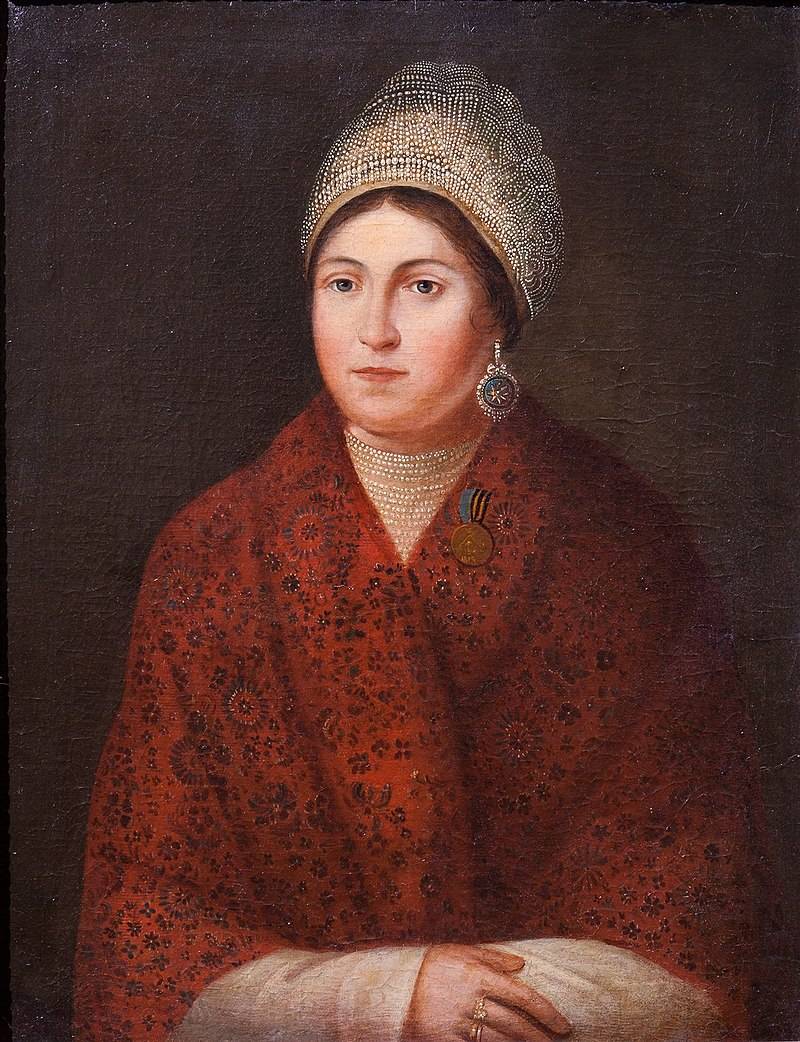
A. Smirnov. Portrait of Vasilisa Kozhina, 1813
In addition, she became the heroine of numerous popular prints, the most famous of which was written by Venetsianov:
Shown here is an authentic episode of the escort of several captured Frenchmen. The officer who led them, who did not want to obey her on the grounds that she was a woman, Vasilisa personally killed. The scythe that she had in her hands on the splint, which you saw above, served as a tool. The explanatory inscription to this splint read:
This, incidentally, is the only reliable evidence of Vasilisa's participation in the "partisan movement." All other stories - about how she created a squad of women and teenage boys, are legend. But, thanks to the publication in the journal "Son of the Fatherland", her name became a symbol of popular resistance to the invaders. Vasilisa was awarded a medal on the St. George ribbon and a prize of 500 rubles.
A similar incident happened in the United States during World War II. Thanks to the photograph taken by Joe Rosenthal, soldiers were declared national heroes, without risking their lives changing the flag previously erected by other people on the top of Mount Suribachi (Japanese island of Iwo Jima).
This is the magical power of the printed word.
But back to Kozhina. Look how the audience of the film "Vasilisa" (2013) saw it.
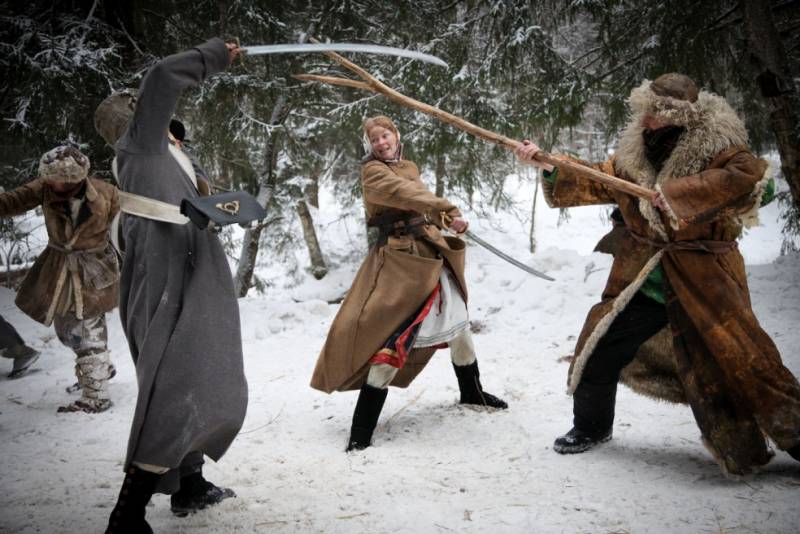
S. Khodchenkova as Vasilisa Kozhina. There is a great lack of a bear, balalaika and vodka. You can also put the group Boney M, performing the song "Rasputin", in the background.
But in the Soviet film "Kutuzov" (1943) everything is fine.
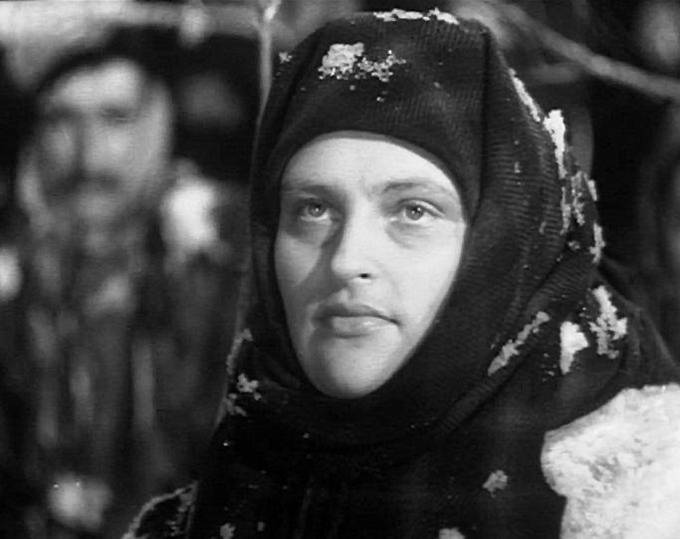
A. Danilova as Vasilisa Kozhina
Now let's talk about Yermolai Chetvertakov, whose exploits are completely real.
He was a soldier of the Kiev dragoon regiment, a participant in the wars with Napoleon in 1805–1807. In August 1812, he was captured in the battle at Tsarev-Zaymishche, but escaped after three days.
In the Gzhatsky district, he managed to create a detachment of peasants from the villages of Zibkovo and Basman. At first, the number of his subordinates did not exceed 50 people, at the end of his campaign it increased to 4 thousand (this figure still needs to be treated with some caution).
Chetvertakov not only attacked the French passing by (it is believed that his detachment had more than 1000 killed enemy soldiers and officers), but controlled the territory “within 35 versts from the Gzhatskaya pier”. In the biggest skirmish, Chetvertakov's detachment defeated an entire battalion.
Some historians bashfully point out that when units of the 26th division of the Russian army, headed by I. Paskevich, approached Gzhatsk, the issue of giving Chetvertakov to a tribunal for "desertion" was being decided. But nothing happened, and he was sent to serve in his regiment.
It is curious that the French considered this private colonel in the Russian army. Given the level of his military talents, we can safely assume that if he was born then in France, he would easily have risen to this rank (if not higher). In tsarist Russia, in November 1812, he was promoted to non-commissioned officer and awarded the soldier's Insignia of the Order of St. George. Participated in the Foreign campaigns of 1813-1814. And, unlike the same Vasilisa Kozhina, he is little known in our country.
Another successful commander of the peasant detachment was Gerasim Kurin from the estate of state peasants. He acted on the territory of the Moscow province.
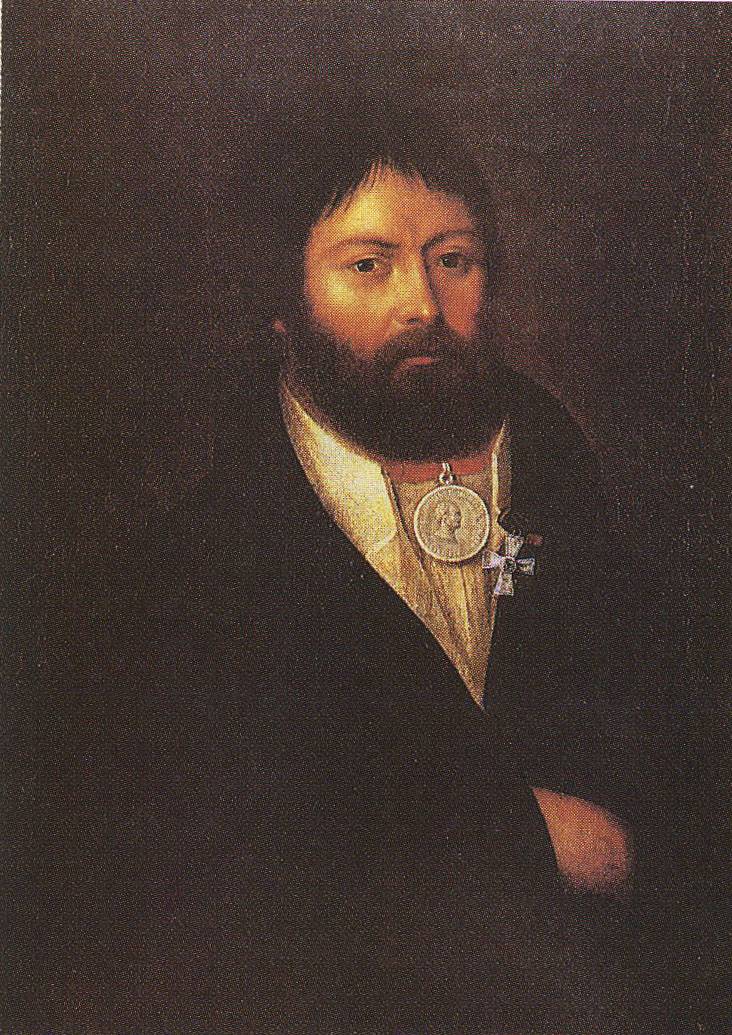
A. Smirnov. Portrait of Gerasim Matveyevich Kurin, 1813
Patriotic historians brought the number of Kurin's detachment to 5300 people with three cannons, and 500 of his subordinates were allegedly cavalrymen. However, there is reason to believe that the riders in this detachment were only 20 people, assigned to Kurin by one of the commanders of the militia of the Vladimir province. The figure of more than five thousand "partisans" near Moscow should also be treated with healthy skepticism. One way or another, it is believed that it was the actions of this detachment that forced the French to leave the city of Bogorodsk. In 1813, G. Kurin was awarded the Soldier's Insignia of the Order of St. George, the Medal of Honor in 1812 and was appointed head of the village of Vokhny.
The detachment of Nikita Minchenkov, operating in the Porechsky district of the Smolnek province, managed to capture the banner of one of the French regiments, as well as capture one of the couriers.
Semyon Silaev, a peasant from the village of Novoselki, Dukhovshchinsky district, is credited with repeating the feat of Ivan Susanin.
Detachments of Ivan Golikov, Ivan Tepishev, Savva Morozov were known near Roslavl. In the vicinity of Dorogobuzh, a detachment of Ermolai Vasiliev operated, near Gzhatsk - Fyodor Potapov.
The names of other peasants have been preserved in the sources of those years: Fedor Kolychev, Sergey Nikolsky, Ilya Nosov, Vasily Lavrov, Timofey Konoplin, Ivan Lebedev, Agap Ivanov, Sergey Mironov, Maxim Vasiliev, Andrey Stepanov, Anton Fedorov, Vasily Nikitin.
So the peasant resistance to the French was quite massive. And sometimes these detachments acted in cooperation with real partisan detachments, consisting of soldiers of regular units, which were commanded by active officers of the Russian army.
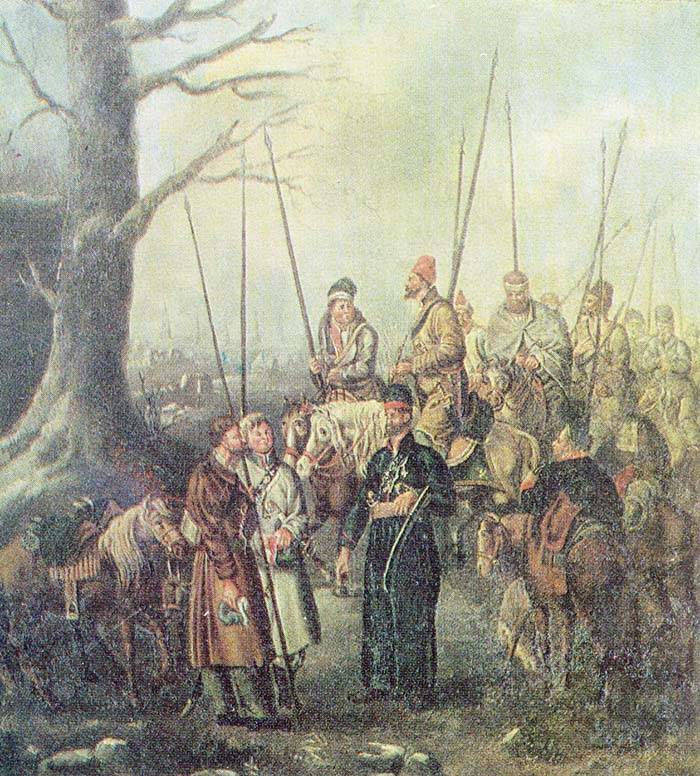
"Partisans". Painting by an unknown artist, first quarter of the XNUMXth century
Alexander Figner especially often used peasant detachments in his operations, as evidenced by Yermolov:
Other well-known commanders of partisan detachments are Denis Davydov, Alexander Seslavin, Ivan Dorokhov. Less well known is Ferdinand Vincengorod's "flying squad", whose vanguard was commanded by Alexander Benckendorff (the former aide-de-camp of Paul I and the future head of the III department).
It is about such "flying" detachments, which were then officially considered partisan, and we will talk in the next article.
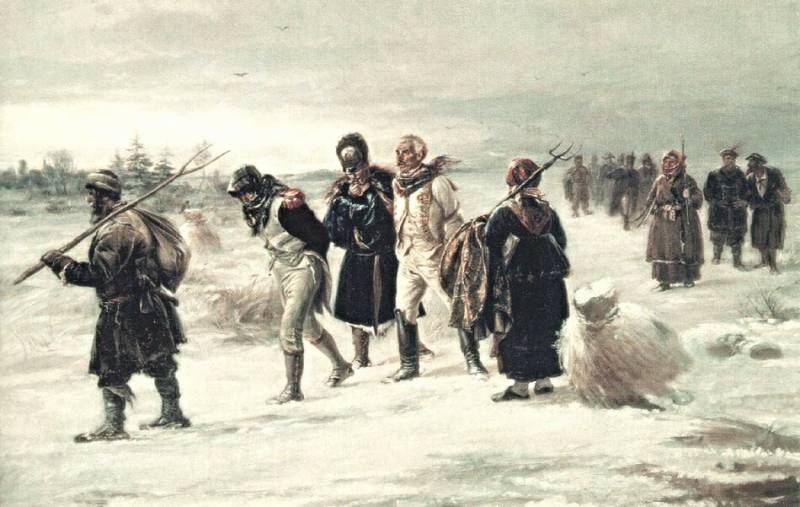
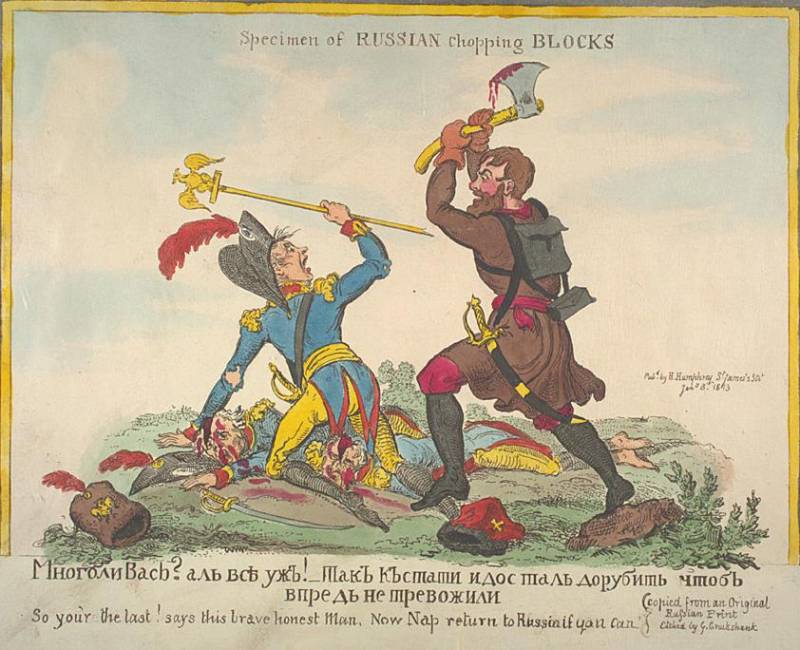
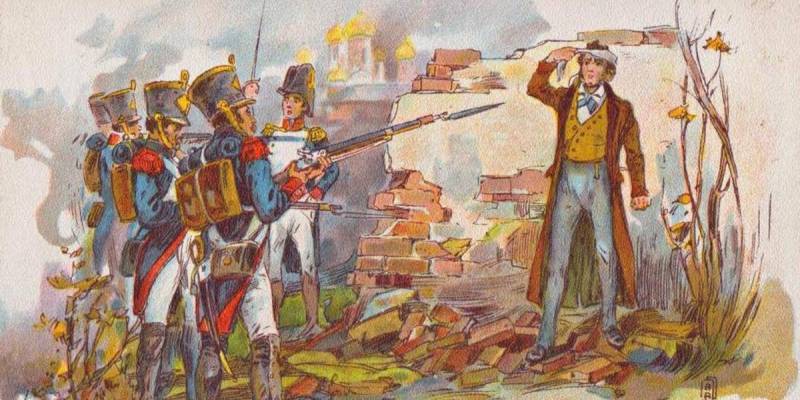
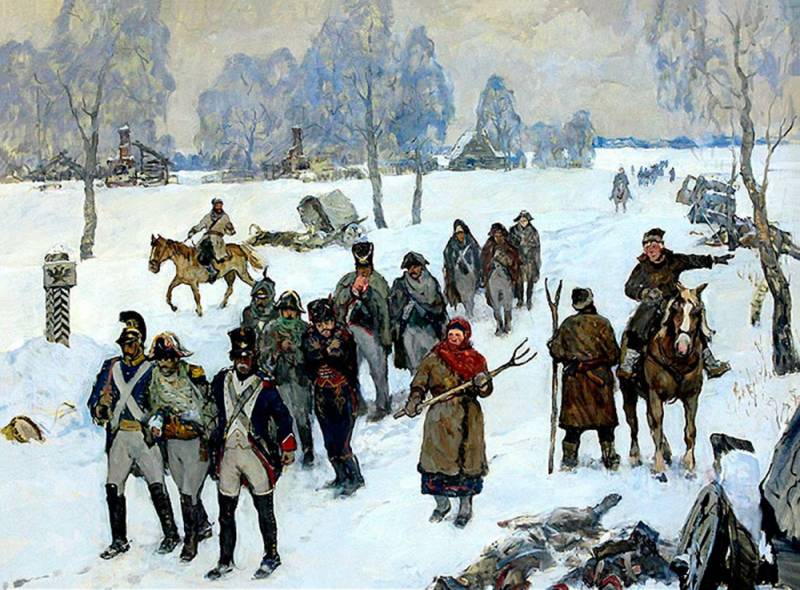
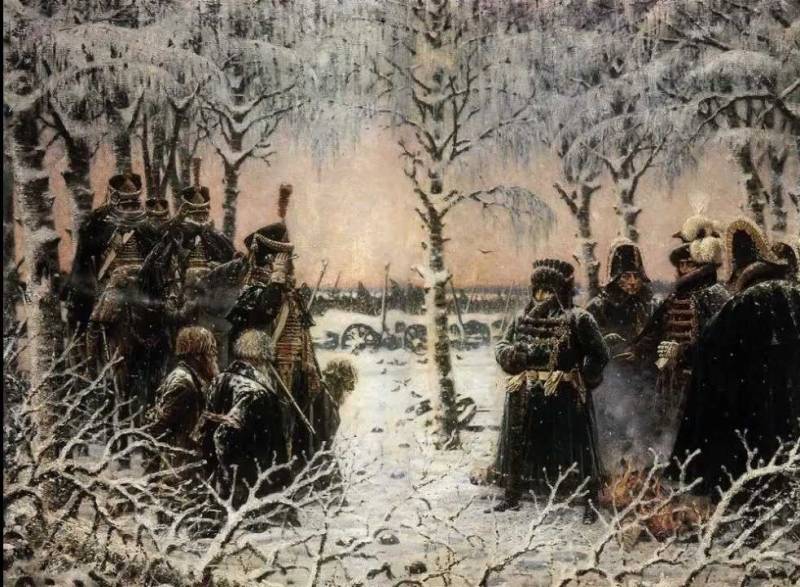
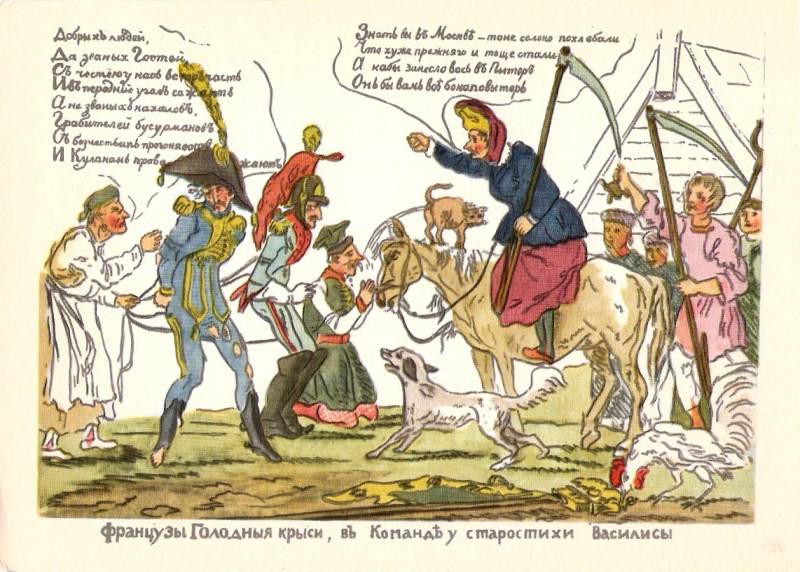
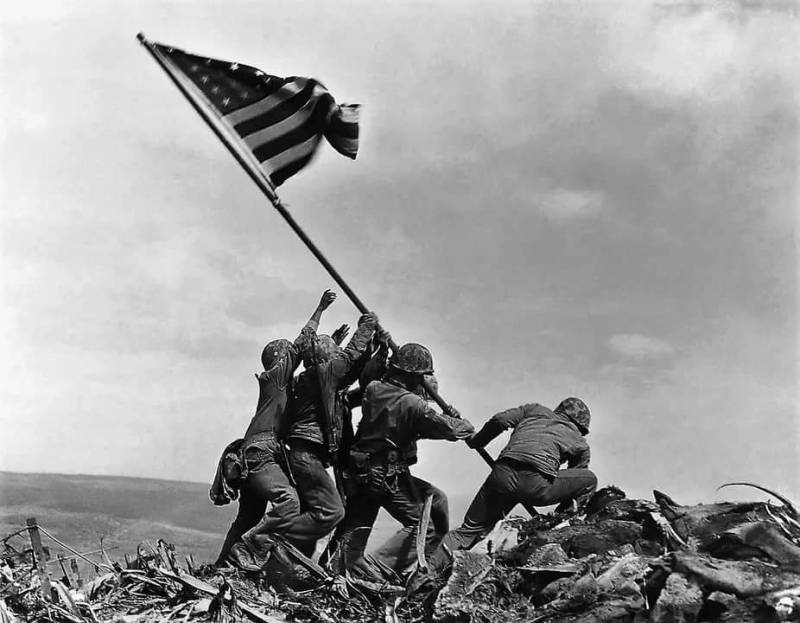
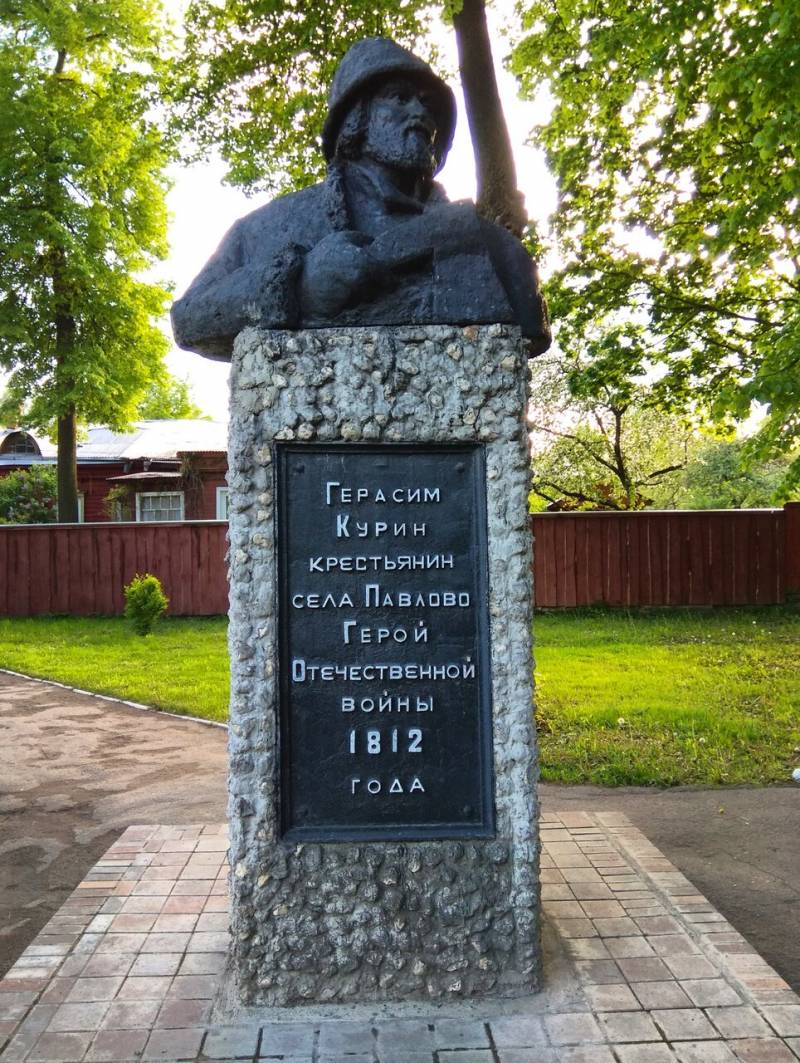
Information